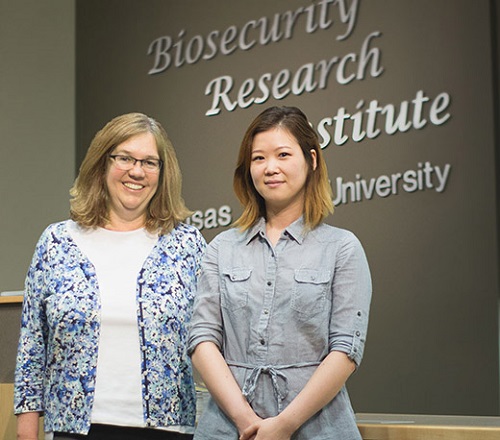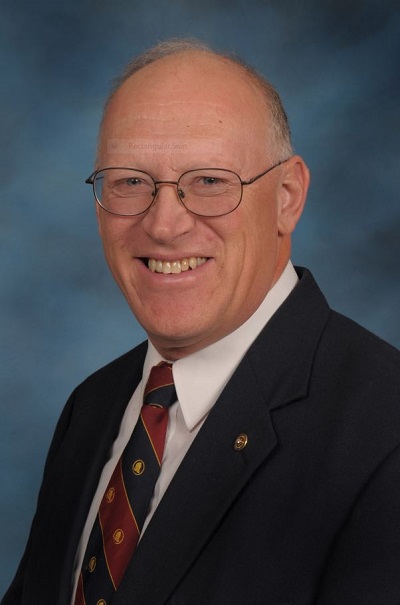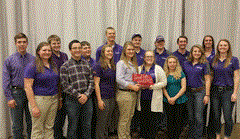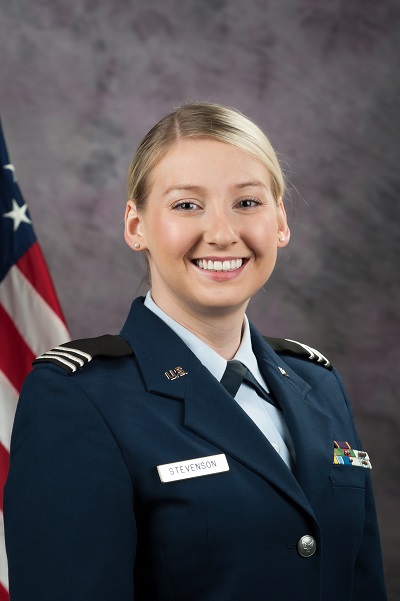06/20/18
K-State Current - June 20, 2018
K-State Current is a weekly news update for the Kansas Board of Regents to apprise the Regents on a few of the many successes and achievements made by K-State faculty, staff and students.
K-State News
Kansas State University conducts first U.S. livestock study with Japanese encephalitis virus

North American domestic pigs could be susceptible to Japanese encephalitis virus infections according to a study by Kansas State University College of Veterinary Medicine researchers. The study is believed to be the first of its kind in the U.S.
The researchers' study was published recently in Scientific Reports.
"Collectively, our study demonstrates for the first time that North American domestic pigs can contribute to the Japanese encephalitis virus transmission cycle as amplifying hosts," said So Lee Park, a third-year veterinary student and concurrent doctoral student in pathobiology who was first author of the study.
Japanese encephalitis virus is a mosquito-transmitted flavivirus that has human and veterinary health significance.
The virus, according to the Centers for Disease Control and Prevention, is transmitted through the bite of a mosquito and is the leading cause of vaccine-preventable encephalitis in Asia and the western Pacific. The virus can be maintained in a cycle between mosquitoes and vertebrates, mainly pigs and wading birds. While most human infections are mild, a small percentage of people develop encephalitis — an infection of the brain — that can include headache, high fever, tremors, coma and more. The CDC says about 1 in 4 cases of Japanese encephalitis are fatal.
Japanese encephalitis virus in swine can cause encephalitis in piglets and reproductive diseases in mature adult pigs.
The Kansas State University study suggests that Japanese encephalitis virus may have the potential to become endemic in the U.S. after an introductory event similar to the recent emergence of West Nile virus, a closely related flavivirus, said Dana Vanlandingham, associate professor of diagnostic medicine and pathobiology and corresponding author.
Earlier research at Kansas State University found that some North American mosquitoes can transmit the virus.
"This means that all components of the transmission cycle are present in the U.S.," said Scott Huang, assistant research professor of diagnostic medicine and pathobiology.
While an introductory event involving Japanese encephalitis virus has yet to happen in the U.S., the Kansas State University researchers recommend increased international and possibly local surveillance of the virus through diagnostic methods. They said that Japanese encephalitis virus is both a significant swine and human pathogen that cannot be ignored.
The research was conducted at Kansas State University's Biosecurity Research Institute. Support for the research was provided in part through a National Bio and Agro-defense Facility, or NBAF, transition grant from the state of Kansas. Japanese encephalitis virus is a priority pathogen that will be studied at NBAF, a federal facility that is under construction adjacent to the university's Manhattan campus. NBAF will be the nation's foremost animal disease facility.
Other Kansas State University contributors to the study included Amy Lyons, research assistant in diagnostic medicine and pathobiology and a master's student in biomedical science; Victoria Ayers, doctoral student in pathobiology; Susan Hettenbach, research assistant at the Biosecurity Research Institute; Kenneth Burton, program director of the National Agricultural Biosecurity Center at Kansas State University; Stephen Higgs, director of the Biosecurity Research Institute and professor of diagnostic medicine and pathobiology; and Scott McVey, a U.S. Department of Agriculture collaborator and director of the Center for Grain and Animal Health Research in Manhattan.
EPA recognizes K-State's Pollution Prevention Institute
The Environmental Protection Agency Office of Small and Disadvantaged Business Utilization has announced that the Kansas State University Pollution Prevention Institute and its director, Nancy Larson, are recipients of the EPA Administrator's Award for Outstanding Accomplishments of a State Small Business Environmental Assistance Provider in Providing Technical Environmental Assistance to the Small Business Community.
Larson received the award May 3 at the EPA Administrator's 28th Annual Small Business Program Awards Ceremony in Washington, D.C.
The Small Business Environmental Assistance Program was established under provisions of Section 507(c) of the U.S. Clean Air Act. The program has been administered for the state of Kansas through the university's Pollution Prevention Institute since 1995. It has assisted thousands of small Kansas business owners, on site and through a hotline, with environmental compliance and pollution prevention.
K-State Faculty Highlights
Ron Wilson named one of the 50 Kansans You Should Know
Ron Wilson, director of the Huck Boyd National Institute for Rural Development, has been named one of the 50 Kansans You Should Know for 2018 by Ingram's Magazine.
As previously noted in K-State Today, the 50 Kansans You Should Know honors high-achieving Kansans. The selection criteria include having a strong reputation as a leader in Kansas, unique interests beyond their normal work, a strong character and high-level integrity.
Wilson has been director of the Huck Boyd Institute since 1990. Through K-State Research and Extension, he has produced and distributed more than a thousand Kansas Profiles about entrepreneurs and community leaders in rural Kansas. He also co-chairs the annual K-State Leadership Seminar.
"Ron has worked tirelessly for many years now on behalf of rural development efforts in Kansas," said Gregg Hadley, associate director for extension. "This is truly a well-deserved honor."
K-State Student News
K-State takes reserve champion Sweepstakes Award at 2018 NACTA Judging Conference
The combined placing of nine agricultural competition teams at the 2018 North American Colleges and Teachers of Agriculture, or NACTA, Judging Conference has earned Kansas State University reserve champion in the Sweepstakes Award for the four-year division.  This was the first time that K-State has entered enough contests to qualify for the sweepstakes challenge.
This was the first time that K-State has entered enough contests to qualify for the sweepstakes challenge.
The conference was hosted by Northeast Community College in Norfolk, Nebraska, in April. A total of 27 four-year and 16 two-year schools competed with 767 individual contestant entries in 13 different contest areas. K-State hosted the NACTA Judging Conference last April.
K-State teams placed first in Equine Judging and Precision Agriculture, second in Crops, Soils, Knowledge Bowl, Dairy Judging, Agriculture Sales/Communications, and Computer Applications, and third in Livestock Management. Several students competed on more than one team. Iowa State was the sweepstakes champion by a slim margin.
Kevin Donnelly served as coach for the Crops, Knowledge Bowl, Precision Ag, and Computer Applications teams. Mickey Ransom and Erin Bush coached the Soils team. The Equine Judging team was coached by James Lattimer and Rachel Sorensen. Jarrod Blackburn was the Dairy team coach and Audrey King coached the Ag Sales/Communications team.
Prestigious fellowship to help Air Force ROTC member earn doctorate

A Kansas State University bachelor's candidate in mechanical and nuclear engineering has received the Chancellor's Fellowship from the University of California, Berkley to work on a doctorate in nuclear materials.
Sarah Stevenson, Wichita, is also a member of K-State's Air Force ROTC and will become a physicist/nuclear engineer for the U.S. Air Force once she earns her doctorate.
Read more about her in this post from the Idaho National Laboratory, where Stevenson has been an intern since summer 2016.